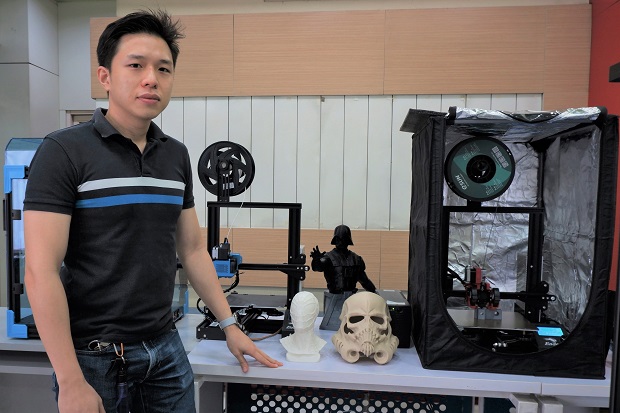Filipinos are naturally creative but one thing holds them back from competing in the global electronics and product development arena: their fear of experimenting with and damaging the actual electronics as they are usually expensive and unavailable in the country.

“Cost and availability are barriers to creativity. Creators and even engineering instructors are afraid of touching and breaking electronics because the parts are expensive,” said Mike Jassen Sy, founder of Makerlab Electronics. “We learn from making mistakes, and yet they are penalized for exploring things.”
With this in mind, Sy, a mechanical engineer, teamed up in 2013 with a classmate from De La Salle University. They started selling electronics by posting them on the buy-and-sell websites Sulit and OLX and meeting up personally with their customers.
At that time, the Philippine electronics development sector was only made up of a very small niche of creators.
“The whole ecosystem was still very underdeveloped. When my partner and I entered the scene, there was no Lalamove yet at that time. So we used to meet up with the creators and we got to learn about the products that they are looking for,” Sy said.
In 2016, the duo formally established Makerlab Electronics. Its goal: to provide affordable components and spare parts to help Filipino creators, designers, and hobbyists bring their ideas to life.
“Eventually, the business grew to where it is now. We now have our own website, then we entered the e-commerce market to make it even more accessible to all. The growth momentum is continuous, and the use of our products is now becoming more common,” Sy said.
Makerlab sources its products mainly from Shenzhen, dubbed as the “Silicon Valley of China.” It is engaged in 3D printing, robotics, and Internet of Things. It also offers low-priced microcontrollers, breakout boards, electrical enclosures, liquid-crystal displays, Raspberry Pi computers, prototyping, relays, sensors, soldering, and wireless technology.
Makerlab’s 3D printers, which are available for as low as P10,000, benefit a wide variety of industries, including medicine, food, fashion and jewelry, agriculture, and toys.
“The Philippine market is price sensitive. One of the reasons we source from China is because of the cost and their proximity to us, because if you get it from other countries, the price is almost triple,” Sy said.
Empowering a new generation of creators
In the past, Makerlab’s target customers were only college students doing their theses, as well as engineering professors.
“But now, we encounter even elementary students looking for sensors for their projects,” he said.
Makerlab aims to be the go-to partner of creators as they start their journey from a young age – from a student entering the science, technology, engineering, and mathematics (STEM) track, when he takes up engineering science in college, and even as he pursues higher education.
“Our objective is to provide all students with the opportunity to compete in this landscape, without being hindered by their economic standing. We want to squash the notion that electronics or robotics are only for the rich. No, there are affordable options,” Sy said.
Their vision is to equip students to have their own mini laboratories at home.
Makerlab is also expanding its geographical presence and is seeing a surge in demand even outside Metro Manila.
“Thankfully, due to Lazada and Shopee and the e-commerce boom, we are able to reach the whole Philippines,” Sy said. “In the past, the suppliers were exclusively found in Raon so it is limited to Metro Manila, but now, there are people in Visayas and Mindanao who are starting to learn robotics as well.”
Small beginnings and growing pains
From a two-person team eight years ago, Makerlab is now made up of around 15 employees, mostly engineers.
But Sy recalled that they were not spared from the usual challenges faced by fledgling startups in the Philippines, especially the difficulty in accessing funding. He also noted the lack of support for the Philippine startup ecosystem and the prohibitive regulations for businesses.
“When you are just starting small, you are on your own. If you survive and grow after five years, that’s the only time that they will support you,” Sy said.
This is in contrast to startups in other countries, which enjoy generous funding that allows them to flourish.
“Even if they stumble, they are not eliminated in the market,” he said. “But for us Filipino startups, we’re afraid of dying out. We have the tendency to not take risks. We’re more careful with our decisions and we’re wise in using our funds.”
With this, Makerlab formed a carefully balanced strategy offering affordable products while generating reasonable profits to allow it to continue its expansion.
By democratizing the electronics industry, Filipino creators can now experiment and make mistakes.
“We want to tell them, don’t be afraid. Even if problems arise, the replacement parts can be delivered quickly and won’t break the bank,” Sy said. “With Makerlab, the only limitation is you.”




